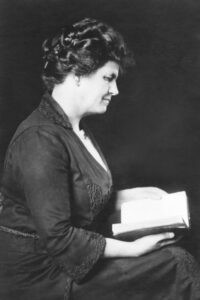
The Girl from Montana
A long procession of funerals seemed to come out of the past and meet her eye as she looked about upon the signs of the primitive, unhallowed one that had just gone out from there a little while before.
The girl closed her eyes, and pressed their hot, dry lids hard with her cold fingers; but the vision was clearer even than with her eyes open.
She could see the tiny baby sister lying there in the middle of the room, so little and white and pitiful; and her handsome, careless father sitting at the head of the rude home-made coffin, sober for the moment; and her tired, disheartened mother, faded before her time, dry-eyed and haggard, beside him. But that was long ago, almost at the beginning of things for the girl.
There had been other funerals, the little brother who had been drowned while playing in a forbidden stream, and the older brother who had gone off in search of gold or his way, and had crawled back parched with fever to die in his mother’s arms. But those, too, seemed long ago to the girl as she stood in the empty cabin and looked fearfully about her. They seemed almost blotted out by the last three that had crowded so close within the year. The father, who even at his worst had a kind word for her and her mother, had been brought home mortally hurt—an encounter with wild cattle, a fall from his horse in a treacherous place—and had never roused to consciousness again.
At all these funerals there had been a solemn service, conducted by a traveling preacher when one happened to be within reach, and, when there was none, by the trembling, determined, untaught lips of the white-faced mother. The mother had always insisted upon it, especially upon a prayer. It had seemed like a charm to help the departed one into some kind of pitiful heaven.
And when, a few months after the father, the mother had drooped and grown whiter and whiter, till one day she clutched at her heart and lay down gasping, and said: “Good-by, Bess! Mother’s good girl! Don’t forget!” and was gone from her life of burden and disappointment forever, the girl had prepared the funeral with the assistance of the one brother left.
Read or download Book
Grace Livingston Hill
Grace Livingston Hill was born in Wellsville, New York to Marcia Macdonald Livingston and her husband, Presbyterian minister, Rev. Charles Montgomery Livingston. Both were writers, as was her aunt, Isabella Macdonald Alden, who wrote under the pseudonym “Pansy.” Hill’s writing career began as a child in the 1870s, writing short stories for her aunt’s weekly children’s publication, The Pansy.
Biography.
Her first story printed in book form was The Esselstynes, which was published in 1877 as part of the “Mother’s Boys and Girls Library” by D. Lothrop & Company. A Chautauqua Idyl, her first book as a young adult, was written in 1887 to earn enough money for a family trip from her Florida home to the summer Chautauqua gathering at Chautauqua, New York. This illustrated allegory of a Chautauqua gathering held by the flowers, trees, and animals was published in time to be offered for sale that summer and brought enough earnings to take the family there. Several books written in collaboration with her family followed in the early 1890s, as well as her only children’s book, A Little Servant. Lack of funds was a frequent motivator, particularly after the death of her first husband left her with two small children and no income other than that from her writing. After the death of Hill’s father less than a year later, her mother came to live with her. This prompted Hill to write more frequently.
During and after her failed ten-year marriage to her second husband Flavius Josephus Lutz, a church organist 15 years her junior, she continued to write to support her children and mother. She stopped using the Lutz surname after they parted ways in May 1914. Although many of her earlier novels were specifically intended to proselytize, Hill’s publishers frequently removed overt references to religious themes. After her publishers realized the popularity of her books, references to religious topics were allowed to remain, although she later modified her writing style to appeal to a more secular audience.
The last Grace Livingston Hill book, Mary Arden, was finished by her daughter, Ruth Hill Munce, writing under the name of Ruth Livingston Hill, and published in 1948.






